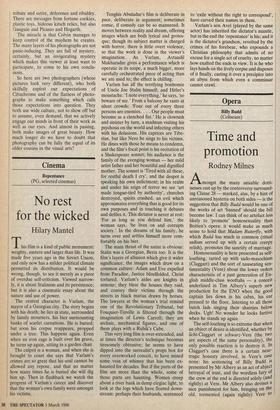Cinema
Repentance (PG, selected cinemas)
No rest for the wicked
Hilary Mantel
This film is a kind of public monument: weighty, austere and larger than life. It was made five years ago in the Soviet Union, and only now has a milder political climate permitted its distribution. It would be wrong, though, to see it merely as a piece of overdue self-criticism. Viewed narrow- ly, it is about Stalinism and its persistence; but it is also a cinematic essay about the nature and use of power.
The central character is Varlam, the mayor of a Georgian city. The story begins with his death; he lies in state, surrounded by family mourners, his bier surmounting banks of scarlet carnations. He is buried; but soon his corpse reappears, propped under a tree. This happens again. Even when an iron cage is built over his grave, he turns up again, sitting in a garden chair.
The culprit is a woman, and when she is brought to court she says that Varlam's crimes are so great that his soul cannot be allowed any repose, and that no matter how many times he is buried she will dig him up. Then in flashback we watch the progress of Varlam's career and discover that the woman's own family were amongst his victims. Tenghis Abuladze's film is deliberate in pace, deliberate in argument; sometimes comic, if comedy can be so mannered. It moves between reality and dream, offering images which are both lyrical and grotes- que; though its subject matter is charged with horror, there is little overt violence, so that the work is done in the viewer's imagination. As Varlam, Avtandil Makharadze gives a performance which is operatic in its scope, a much bigger, more carefully orchestrated piece of acting than we are used to; the effect is chilling.
Varlam has all the terrifying bonhomie of Uncle Joe Stalin himself; and Hitler's moustache. 'I note everything,' he says, 'so beware of me.' From a balcony he rants at silent crowds: 'Four out of every three persons are enemies. . . . Our people must become as a clenched fist.' He is clownish and sinister by turn, a madman visiting his psychosis on the world and infecting others with his delusions. His caprices are Tibe- rian, but like Nero he sings to his victims. He dines with those he means to condemn, and the film's focal point is his recitation of a Shakespeare sonnet; his audience is the family of the avenging woman — her mild artist father and her beautiful and dignified mother. The sonnet is 'Tired with all these, for restful death I cry', and the despot is speaking his own indictment; in his realm and under his reign of terror we see 'art made tongue-tied by authority', churches destroyed, spirits crushed, an evil which approximates everything that is good for its own purposes and in touching it debases and defiles it. This dictator is never at rest: Tor as long as you defend him,' the woman says, 'he lives on and corrupts society.' In the dreams of his family, he turns over and settles himself more com- fortably on his bier.
The main thrust of the satire is obvious: Stalin was a Georgian, Beria too. It is the film's layers of allusion which give it wider significance, the images which draw on a common culture: Adam and Eve expelled from Paradise, Justice blindfolded, Christ tortured. Varlam's aides are knights in armour; they bless the houses they raid, and convey their victims through the streets in black marias drawn by horses. The lawyers at the woman's trial remind one of the Revolutionary Tribunal, but Fouquier-Tinville is filtered through the imagination of Lewis Carroll; they are archaic, mechanical figures, and one of them plays with a Rubik's Cube.
This very long film is over-extended, and at times the director's technique becomes tiresomely obtrusive; he seems to have dipped into the surrealist's props box for every overworked conceit, to have mined some vein of whimsy that has been ex- hausted for decades. But if the parts of the film are more than the whole, some of those parts are haunting. Women creep about a river bank in damp elegiac light, to look at the logs which have floated down- stream: perhaps their husbands, sentenced to 'exile without the right to correspond', have carved their names in them.
Varlam's son Avel (played by the same actor) has inherited the dictator's mantle, but in the end the 'repentance' is his; and it is the dictator's grandson, revolted by the crimes of his forebear, who expounds a Christian philosophy that admits of no excuse for a single act of cruelty, no matter how exalted the ends in view. It is he who lays hands on the lively corpse and disposes of it finally, casting it over a precipice into an abyss from which even a commissar cannot crawl.


















































 Previous page
Previous page